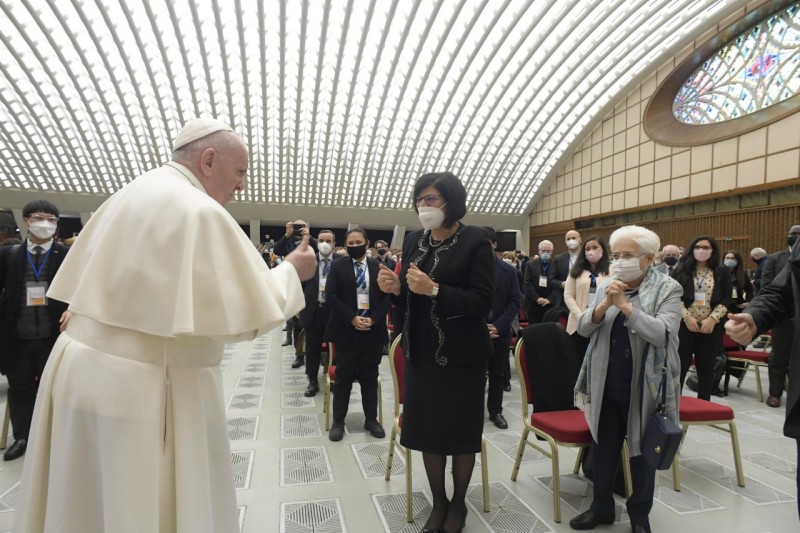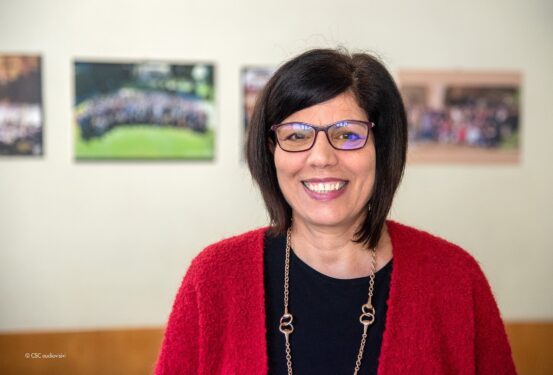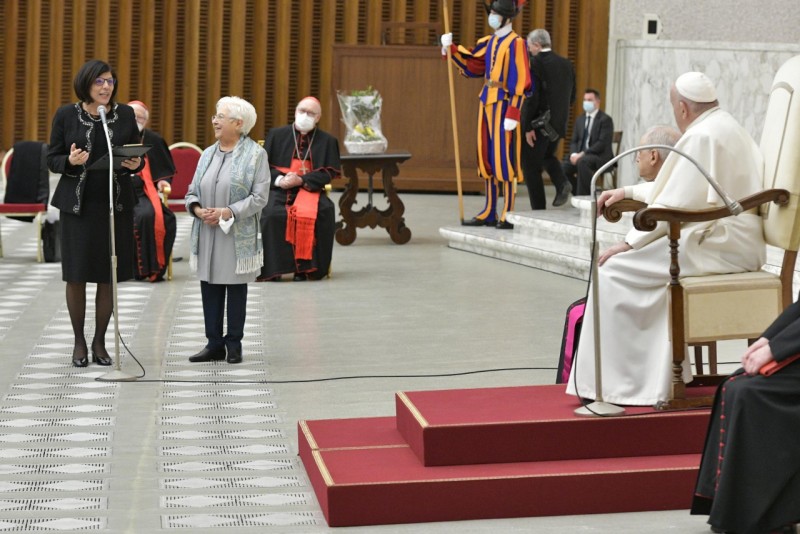
WINDSOR TERRACE — As a child in Israel during the 1960s, Margaret Karram was confused about her identity.
Her home on Mount Carmel was in a Jewish neighborhood, but her parents were Arabs from Palestine, which drew teasing from local kids. And, being Catholic, she did not easily identify with Palestinian Muslims. She yearned for peace as violent conflicts plagued the Holy Land.
At age 15, she discovered “The Work of Mary,” also known as the “Focolare Movement.” This international ecumenical organization, founded during World War II by Italian Catholics, strives for unity among all people according to the will of a loving God.
The teachings of Focolare’s founder, school teacher Chiara Lubich, swapped Karram’s confusion with peace and brotherly love. She became a Focolare leader, learning and living the Gospel and sharing a lifestyle of seeing each person — no matter race or religion — as a godly creation worthy of love and kindness.
On Jan. 31, the Focolare’s general assembly elected Karram to be its next president. Besides Lubich, there had been only one other Focolare leader — Italian lawyer Maria Voca, who stepped down because of term limits.
Karram, Voca, and members of the assembly had an audience with Pope Francis on Feb. 5 at the Vatican.
“I repeat before you, Your Holiness, the words, ‘Here I am,’ that I pronounced at my election,” Karram said. “But, I don’t like the word ‘president.’ I’m a daughter of the Church, and I want to be at your service and the service of all.”
Karram’s pledge drew applause from the assembly and Pope Francis joined in with a thumbs up and a broad smile.
One small act of kindness
Margaret Karram was born in 1962 in Haifa, Israel. She recalls a pivotal moment in her childhood that set the stage for her work with Focolare.
“When I was 5 years old,” she said in a recent interview, “our house was in the city of Haifa, a region in Galilee. It was the only non-Jewish home in that whole neighborhood. So whenever I would go out to play, there would be all the Jewish children around me.
“I remember that they often made fun of me. Once they teased me so much that I went home crying because I really felt hurt and angry.”
Karram’s mother told her to invite the children to their home and share fresh-baked bread. The kids’ parents then visited to thank the family for their kindness.
“I had to swallow my pride and anger, dry my tears, and tell those children to come over,” Karram said. “It taught me that it is not words, but a small gesture of love toward a neighbor — even one who is different from me, who may also be my enemy — that can dissipate fear and build peace. That is what a small action taught me.”

Karram earned a bachelor’s degree in Jewish Studies from the American Jewish University in Los Angeles.
She held various Focolare leadership positions in Los Angeles and Jerusalem and held membership in various commissions and organizations that promote dialogue among religions. Included are the Episcopal Commission for Interreligious Dialogue, the Assembly of Catholic Ordinaries of the Holy Land, and the Interreligious Coordinating Council in Israel. She also worked for 14 years at the Italian consulate in Jerusalem.
Karram speaks Arabic, Hebrew, Italian, and English. From 2014 until she was elected president, Karram was a counselor for Italy and Albania at the Focolare International Center in Rome.
“For me, these past six years have been an enriching experience,” Karram said. “The more we work together, the more we can witness to the world the beauty of unity and the riches of the various charisms. This is my experience in a nutshell.”
A presence of spirituality
A few Focolare members in New York City said they were excited to learn about Karram becoming president and her background.
While none of them had met her yet, they deferred to a Fordham University faculty member who does not belong to Focolare but is a longtime friend of the movement and Karram herself.
Law professor Russell Pearce is the founder of Fordham’s Institute on Religion, Law and Lawyer’s Work. He is a reformed Jew who met Karram about 18 years ago while researching Focolare teachings.
The institute helps law students and lawyers learn how religion and spirituality can become a nurturing aspect of their legal careers.
“When I started teaching,” Pearce said, “I was thinking in terms of Jewish person how we’re taught that every moment has potential to be sacred, and how to bring that into law.”
He added that because Jesuits founded Fordham, he delved into their mission and principles, like caring for the entire person. Pearce joined in Catholic-Jewish interfaith dialogues in Israel and Rome, where he developed contacts with Focolare leaders.
Pearce said he felt some trepidation at first. Although he had lifelong Christian friends, he was afraid of Christianity because of his ancestors’ persecution in Europe.
“Getting to know the Focolare totally changed my understanding of Christianity,” he said. “They only wanted to know what was in my heart, what kind of human being I was. That’s not what I expected, and it was really beautiful.
“I got to meet all these amazing people, and one of them was Margaret.”
Later, Pearce arranged tours of the Holy Land but he wanted his fellow travelers, most of them Catholic, to get a Christian perspective of the region. He reached out to Karram for assistance.
“The Jewish perspective is everywhere,” he said, “but Jewish tour guides aren’t necessarily going to show you the Stations of the Cross unless you ask them.
“Margaret and her colleagues were just very welcoming. Every time I visited there, I met with them.”
Pearce became inspired to read the written works of Chiara Lubich and “got a wonderful insight into God, and how to live a Godly life.” He said Karram is an example of that.
The professor recalled how he once watched her conduct a Haifa conference for Jewish, Muslim, and Christian youth.
“That’s not easy to do over there,” Pearce said. “There may be a cessation of war, but there still is a lack of peace. But in that context, Margaret put together conversations for adults, but also youth.”
“The presence of spirituality she had — whether speaking with a Palestinian family about the value of having dialogue with Jews, or explaining to Jews why it was important for them to take a risk having those talks — I was in awe of that,” he added.
A leaven of a new humanity
Pope Francis, on Feb. 6, urged the general assembly to hold to Focolare’s mission.
“Your spirituality,” he said, “characterized by dialogue and openness to different cultural, social, and religious contexts, can certainly encourage this process.
“Openness to others, whoever they may be, must always be cultivated: the Gospel is meant for everyone, but not by proselytism, no. It is meant for everyone; it is a leaven of new humanity in every place and time.”
In concluding her address to the pope, Karram conveyed Focolare’s diversity and commitment.
“We’re diverse in age and vocation,” she told the Pontiff. “As you can see here, many young people, Christians of various churches, a Jewish rabbi, two Muslims, a Buddhist, and people of non-religious beliefs, all took part in the assembly.
“What brings us together and guides us is Chiara Lubich’s charism of unity, which for today’s world seems more alive and relevant than ever, and nourishes in all of us the same passion that all may be one, that Jesus left us as a testament.”


All the best to Margaret Karram in her service to the Focolare Movement. God bless.